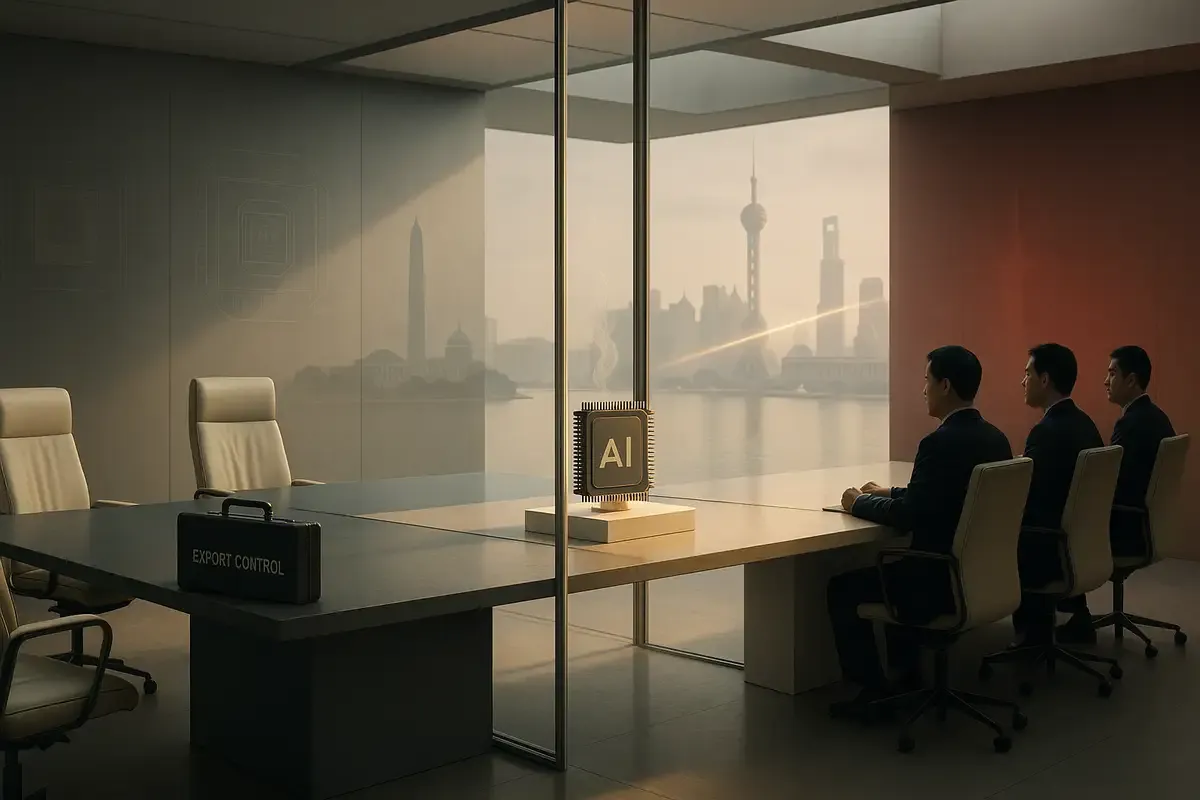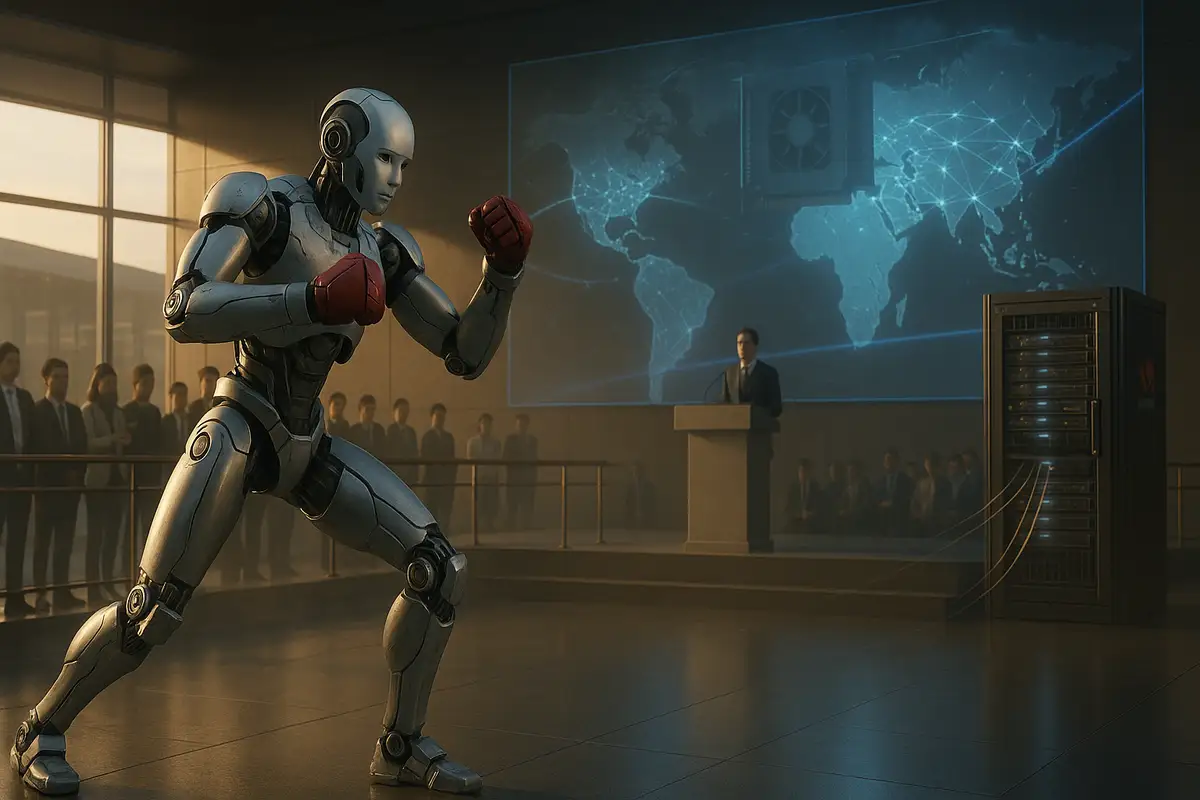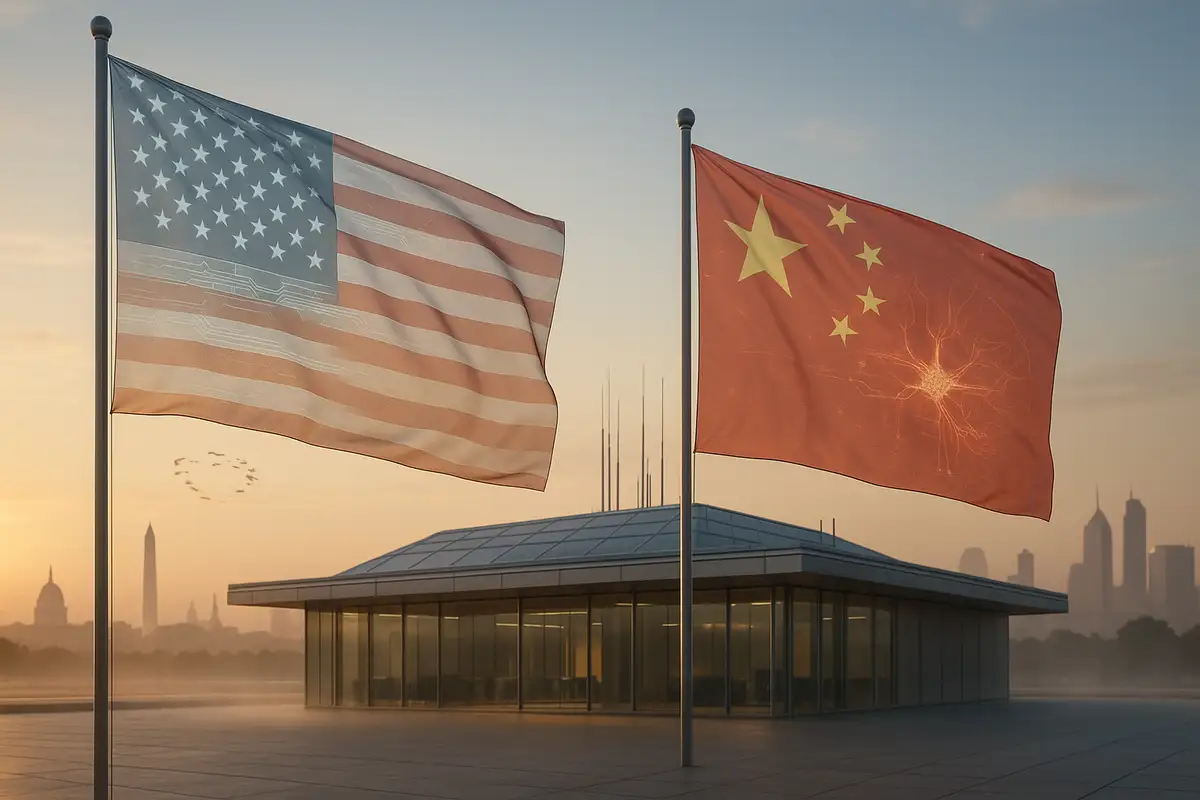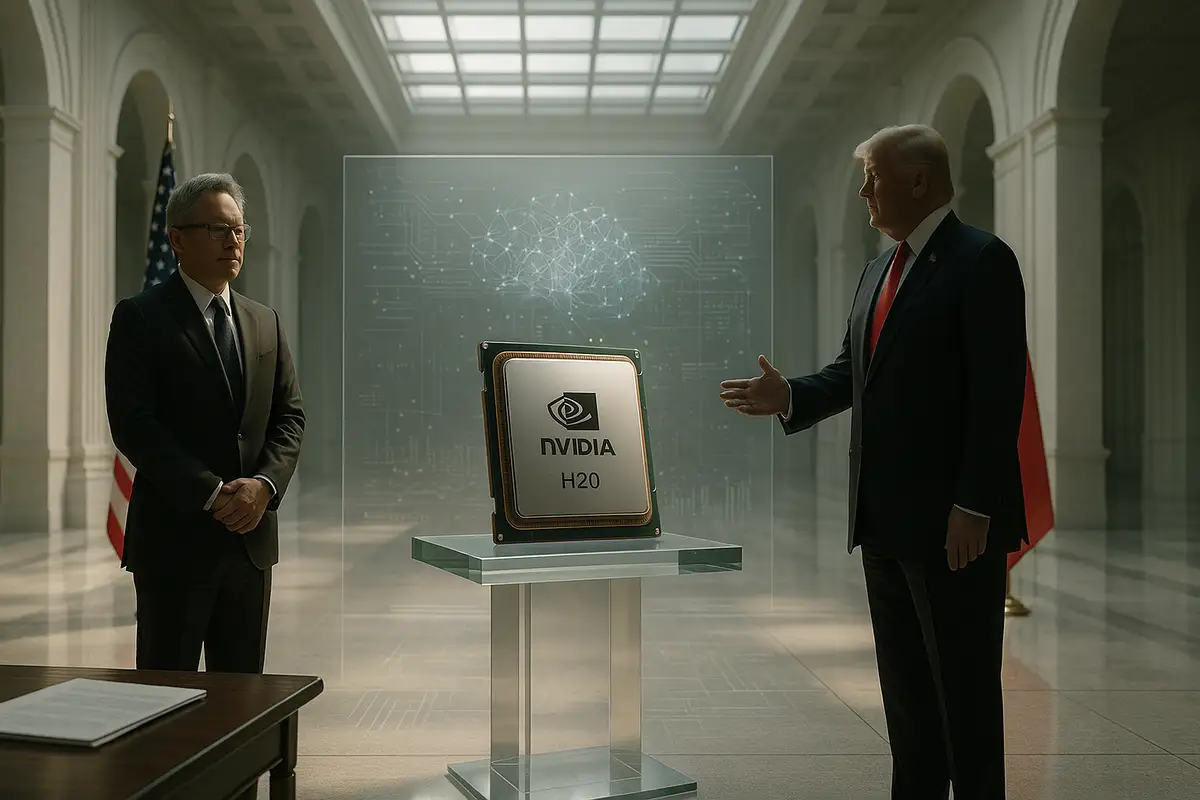Apple Pays $2 Billion to Read Your Face
Apple acquired Israeli startup Q.AI for close to $2 billion, gaining facial micro-movement technology that decodes silent speech for future wearables.
Trump freezes AI chip export controls to smooth China trade talks, alarming security experts who warn he's trading America's tech advantage for uncertain diplomatic gains. Twenty former officials call it a "strategic misstep."

💡 TL;DR - The 30 Seconds Version
🛑 Trump froze export controls on AI chips to China to smooth trade negotiations and secure a meeting with Xi Jinping this year.
💻 Nvidia can now resume selling H20 AI chips to China after CEO Jensen Huang lobbied Trump directly in April.
⚠️ Over 20 security experts including Matt Pottinger and Steve Bannon warn the H20 chip will boost China's military AI capabilities.
🤝 US and Chinese negotiators meet Monday in Stockholm for their third round of trade talks since the freeze began.
📋 The administration hasn't actually issued any H20 export licenses yet, maintaining technical control over each transaction.
🎯 Critics say Trump is trading America's most effective tech control tool for uncertain diplomatic gains with China.
Trump's administration quietly hit pause on restricting AI chip exports to China. The goal? Smooth trade talks and score a face-to-face with Xi Jinping this year.
The Commerce Department's export control team got clear instructions months ago: don't rock the boat with China. Sources from inside and outside government describe a broad freeze covering semiconductors and other sensitive technologies.
Trump isn't just delaying decisions here. He's making a deliberate choice to prioritize diplomacy over security hawks' warnings. Some companies are already benefiting while former officials raise alarms.
Nvidia's H20 processor sits at the center of this controversy. Trump planned to block the chip entirely in April. Then Nvidia CEO Jensen Huang made his case directly to the administration.
The result? A complete reversal. Nvidia announced this month it can resume H20 sales to China after getting assurances that licenses would flow. The company hopes to start deliveries soon.
But the H20 wasn't just any chip. Nvidia designed it specifically for Chinese customers after Biden-era restrictions blocked more advanced processors. Security officials worry it hands China a powerful AI accelerator that could boost military capabilities.
The chip debate reveals a fundamental split in how people view technology exports. Nvidia argues the H20 helps America maintain tech leadership by keeping Chinese developers buying American chips rather than building their own. Security experts worry it speeds up China's military AI programs.
U.S. and Chinese negotiators meet Monday in Stockholm for their third round of talks. Treasury Secretary Scott Bessent faces Chinese Vice Premier He Lifeng in what sources describe as crucial discussions.
Trump wants this meeting with Xi to happen. He's betting that easing export restrictions creates goodwill that translates into a breakthrough deal. The administration already survived Chinese retaliation on rare earth exports in May. Officials don't want to trigger another round.
Trump hinted Friday that deal parameters exist, though he wouldn't share details. The Stockholm talks could determine whether his diplomatic gamble pays off or becomes another missed opportunity.
Twenty former officials and security experts plan to challenge the administration's approach Monday. Their letter to Commerce Secretary Howard Lutnick doesn't mince words about the risks.
"This move represents a strategic misstep that endangers the United States' economic and military edge in artificial intelligence," they write.
The signers include Matt Pottinger, Trump's former deputy national security adviser, and David Feith, who worked technology issues for the current administration's National Security Council. Steve Bannon, Trump's former strategist, called allowing H20 sales a "big mistake."
Their technical argument centers on the H20's capabilities. They claim it outperforms even restricted chips in "inference" tasks—running AI models rather than training them. The chip excels at tasks like powering autonomous weapons and surveillance systems.
The letter warns: "We're helping build the infrastructure China will use to expand its military."
Nvidia dismisses these concerns as "misguided" and "inconsistent" with Trump's AI action plan. The company insists the H20 won't enhance military capabilities but will help America win developer support worldwide.
The business case is straightforward. China represents a massive market for AI chips. Blocking that market hands Chinese companies incentives to develop domestic alternatives that could eventually challenge U.S. dominance.
James Mulvenon from Pamir Consulting sees bigger issues at stake. "These decisions will determine which political system, which values, will ultimately control the most powerful technology in the history of the world."
But Jimmy Goodrich from RAND Corporation focuses on technical specs. He notes the H20 "excels at memory bandwidth beyond any current domestic Chinese chip"—exactly what large-scale AI development requires.
The H20 debate masks a broader policy freeze. The Commerce Department planned to add Chinese chipmaker subsidiaries to export blacklists in May. Those restrictions still haven't appeared.
The targets have since expanded to include subsidiaries of any Chinese group already blacklisted. The U.S. even informed China about these plans, according to people familiar with the matter.
This represents one key test of whether Trump will take tough measures on China or prioritize trade negotiations. So far, negotiations are winning.
"Trump has now effectively frozen U.S. export controls and given away the H20 semiconductor for nothing, undermining one of our most critical national security tools," one former official said.
Despite policy changes, the administration hasn't issued actual H20 export licenses yet. This creates an odd situation where Nvidia can promise deliveries while the government maintains technical authority over each transaction.
A Commerce Department spokesperson emphasizes that Trump imposed license requirements Biden never did. Applications will get "careful" review that accounts for "both benefits and costs" of potential exports.
Several people familiar with the process confirm no licenses have been approved. This suggests the administration wants to maintain leverage while keeping the door open.
The approach reflects Trump's negotiating style—create uncertainty that can be resolved through deals. Whether that works with China remains to be seen.
Why this matters:
• Trump is trading America's most effective tech control tool for uncertain diplomatic gains with a strategic rival that has repeatedly broken trade promises.
• The H20 chip decision could determine whether the U.S. maintains its AI advantage or accidentally accelerates China's military modernization—making this about much more than trade talks.
Q: What makes Nvidia's H20 chip different from other AI processors?
A: Nvidia designed the H20 specifically for China after Biden blocked more advanced chips. Security experts say it outperforms restricted chips in "inference" tasks—running AI models rather than training them. This makes it useful for real-time military applications like autonomous weapons and surveillance systems.
Q: Why does China have leverage over rare earth exports?
A: China controls roughly 60% of global rare earth mining and 85% of processing. These materials are essential for electronics, defense systems, and renewable energy. China restricted rare earth exports to the U.S. for the first time in May 2025, showing it can retaliate against American tech restrictions.
Q: How much is China's AI chip market worth to U.S. companies?
A: China represents Nvidia's second-largest market after the U.S., worth billions in annual revenue. Before restrictions, China accounted for roughly 20-25% of Nvidia's data center revenue. Losing this market permanently could force Chinese companies to develop competing chips, threatening long-term U.S. dominance.
Q: What specific military uses worry security experts most?
A: Experts fear the H20 will power autonomous weapons systems, advanced surveillance networks, and intelligence platforms. The chip excels at "inference" tasks—running AI models in real-time rather than training them. This capability is crucial for military AI that needs to make split-second decisions in combat or surveillance scenarios.
Q: How long have AI chip export controls been in place?
A: Biden started restricting advanced AI chip exports to China in October 2022, targeting chips like Nvidia's H100. Trump initially planned to tighten these rules in April 2025 by blocking the H20, but reversed course after Nvidia lobbied directly. The current freeze has lasted several months.
Q: What happened in previous rounds of these trade talks?
A: Monday's Stockholm meeting marks the third round of Trump-Xi trade negotiations. Previous talks in Geneva and London failed to produce breakthroughs, though both sides continue meeting. Trump wants these talks to lead to a face-to-face meeting with Xi Jinping before the end of 2025.
Q: What could China do if Trump changes course again?
A: China could expand its rare earth export restrictions, which it used for the first time in May. It might also accelerate domestic chip development, impose new restrictions on U.S. companies operating in China, or target other critical materials like lithium and cobalt that America needs for batteries and defense systems.
Q: When will we know if Trump's strategy worked?
A: The Stockholm talks Monday could signal progress toward a Trump-Xi meeting. If that happens by year-end and produces a trade deal, Trump's gamble pays off. If talks stall or China develops competitive chips faster because of H20 access, the strategy may backfire within 12-18 months.



Get the 5-minute Silicon Valley AI briefing, every weekday morning — free.